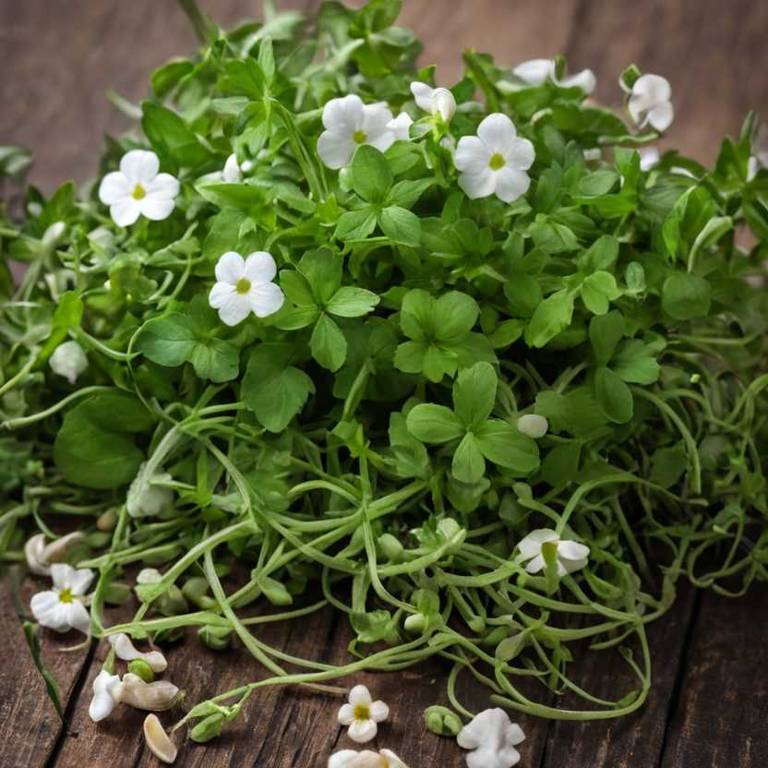Bacopa (Bacopa monnieri)
Bacopa (Bacopa monnieri) is a member of the Scrophulariaceae family, native to Southern Asia, Eastern Africa, and Northern Australia. Traditionally, its leaves, stems, and rhizomes have been used for decoctions, infusions, and powders.
This herb is particularly valued for its tonic, anti-inflammatory, and sedative actions, and has a long history of use in ayurvedic medicine, traditional chinese medicine, and unani medicine.

Quick Facts / Key Information
| Common Name | Bacopa |
|---|---|
| Scientific Name | Bacopa monnieri |
| Plant Family | Scrophulariaceae |
| Genus | Bacopa |
| Species | monnieri |
| Native Range | Southern Asia, Eastern Africa, Northern Australia |
| Plant Parts Used | Leaves, Stems, Rhizomes |
| Primary Medicinal Actions | Tonic, Anti-Inflammatory, Sedative |
| Primary Traditional Systems | Ayurvedic Medicine, Traditional Chinese Medicine, Unani Medicine |
| Historical Preparation Methods | Decoction, Infusion, Powder |
Botanical Identity
- Scientific Name
- Bacopa monnieri
- Common Name
- Bacopa
- Synonyms / Alternative Names
- Water Hyssop, Brahmi, Water Hyssop
- Plant Family
- Scrophulariaceae
- Genus
- Bacopa
Botanical Description
- Growth Habit
- Perennial herbaceous plant.
- Height
- It typically grows to a height of 10 to 30 centimeters.
- Leaves
- Smooth, dorsiventral leaves with upper surface glabrous and darker green, lower surface pale green and covered with stomatal bands.
- Flowers
- Small white flowers with five petals arranged in clusters, actinomorphic symmetry, with two prominent stamens and a superior ovary.
- Stems
- Elongated, erect growth habit with opposite branching, smooth surface, and presence of nodes.
Traditional Uses / Historical Use
Traditional Systems
- Ayurvedic Medicine
- Traditional Chinese Medicine
Historical Preparation Methods
- Decoction
- Infusion
- Powder
- Tincture
Medicinal Actions
- Tonic
- In herbal literature, noted as a gentle tonic, in whole-system applications.
- Anti-inflammatory
- Historically regarded as a cooling anti-inflammatory, for irritation-related applications.
- Sedative
- In herbal texts, considered a soothing sedative, in nervous system–related contexts.
- Bitter
- As described in traditional systems, a calming bitter, for digestion-related formulations.
Active Compounds
- Saponin
- Secondary plant compounds composed of sugar-linked aglycones.
- Flavonoid
- A group of naturally occurring compounds commonly present in many flowering plants.
- Tannin
- High-molecular-weight phenolic compounds found in many plant species.
- Terpenoid
- Naturally occurring metabolites widely distributed in leaves, flowers, and roots.
Modern Research Overview
This section is reserved for future summaries of scientific research related to this plant. As additional verified sources are reviewed, relevant study information will be added here.
Safety & Contraindications
- General Precautions
- General precautions have been noted regarding the use of this herb.
- Contraindications
- Specific contraindications associated with this herb have not been well documented.
- Allergies
- Reports of allergic reactions to this herb are not well documented in available sources.
- Drug Interactions
- The use of this herb alongside pharmaceutical medications may result in potential interactions.
- Toxicity
- There is insufficient evidence to determine the toxic potential of this herb.
- Pregnancy & Breastfeeding
- Available information regarding use during pregnancy or breastfeeding is limited.
Preparation & Usage Methods
- Infusion
- Infusions are commonly prepared using hot water to release aromatic and soluble components.
- Decoction
- This method uses sustained heat to extract compounds from firm plant structures.
- Poultice
- This method uses direct contact between plant material and the skin.
- Powder
- A preparation created by pulverizing dried plant material.
- Extract
- A preparation involving the separation of plant constituents without alcohol.
Growing, Harvesting & Storage
Growing / Cultivation
- Soil
- Prefers loamy soil with well-drained conditions. Typically grows best in organically rich soils.
- Sunlight
- Thrives in partial sun. Tolerates full sun to partial shade.
- Watering
- Prefers well-balanced moisture levels. Tolerates moderate moisture fluctuations.
Medical Disclaimer
The information provided on this page is for educational and informational purposes only. It is not intended to diagnose, treat, cure, or prevent any medical condition. Always consult a qualified healthcare professional before using any herb for medicinal purposes.